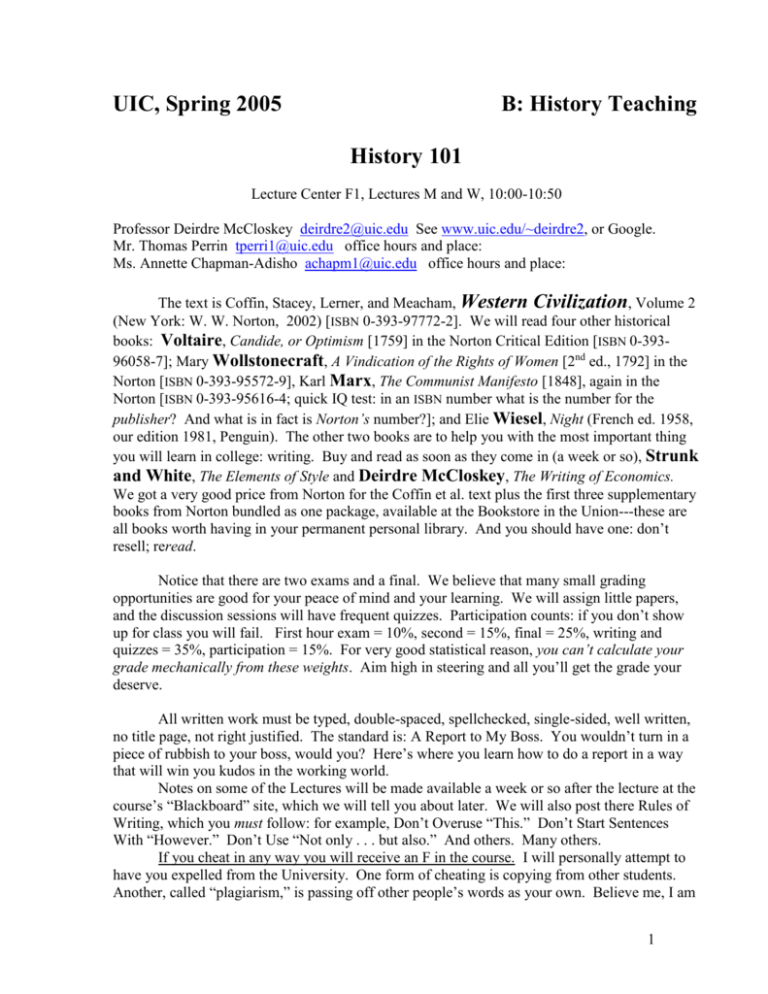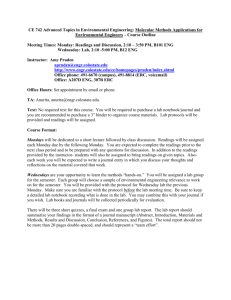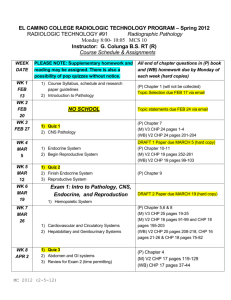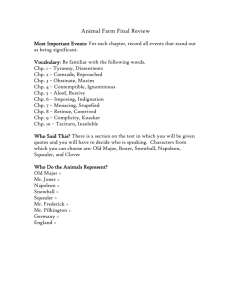History 101
advertisement

UIC, Spring 2005 B: History Teaching History 101 Lecture Center F1, Lectures M and W, 10:00-10:50 Professor Deirdre McCloskey deirdre2@uic.edu See www.uic.edu/~deirdre2, or Google. Mr. Thomas Perrin tperri1@uic.edu office hours and place: Ms. Annette Chapman-Adisho achapm1@uic.edu office hours and place: The text is Coffin, Stacey, Lerner, and Meacham, Western Civilization, Volume 2 (New York: W. W. Norton, 2002) [ISBN 0-393-97772-2]. We will read four other historical books: Voltaire, Candide, or Optimism [1759] in the Norton Critical Edition [ISBN 0-39396058-7]; Mary Wollstonecraft, A Vindication of the Rights of Women [2nd ed., 1792] in the Norton [ISBN 0-393-95572-9], Karl Marx, The Communist Manifesto [1848], again in the Norton [ISBN 0-393-95616-4; quick IQ test: in an ISBN number what is the number for the publisher? And what is in fact is Norton’s number?]; and Elie Wiesel, Night (French ed. 1958, our edition 1981, Penguin). The other two books are to help you with the most important thing you will learn in college: writing. Buy and read as soon as they come in (a week or so), Strunk and White, The Elements of Style and Deirdre McCloskey, The Writing of Economics. We got a very good price from Norton for the Coffin et al. text plus the first three supplementary books from Norton bundled as one package, available at the Bookstore in the Union---these are all books worth having in your permanent personal library. And you should have one: don’t resell; reread. Notice that there are two exams and a final. We believe that many small grading opportunities are good for your peace of mind and your learning. We will assign little papers, and the discussion sessions will have frequent quizzes. Participation counts: if you don’t show up for class you will fail. First hour exam = 10%, second = 15%, final = 25%, writing and quizzes = 35%, participation = 15%. For very good statistical reason, you can’t calculate your grade mechanically from these weights. Aim high in steering and all you’ll get the grade your deserve. All written work must be typed, double-spaced, spellchecked, single-sided, well written, no title page, not right justified. The standard is: A Report to My Boss. You wouldn’t turn in a piece of rubbish to your boss, would you? Here’s where you learn how to do a report in a way that will win you kudos in the working world. Notes on some of the Lectures will be made available a week or so after the lecture at the course’s “Blackboard” site, which we will tell you about later. We will also post there Rules of Writing, which you must follow: for example, Don’t Overuse “This.” Don’t Start Sentences With “However.” Don’t Use “Not only . . . but also.” And others. Many others. If you cheat in any way you will receive an F in the course. I will personally attempt to have you expelled from the University. One form of cheating is copying from other students. Another, called “plagiarism,” is passing off other people’s words as your own. Believe me, I am 1 merciless about plagiarism, and I and the other instructors are well supplied with computer aids to detecting it! No mercy! Don’t do it! We can have only 150 people in the class: the fire codes are being strictly enforced. Therefore, drop early if you’re going to, to help your fellow students who need the class. Read what is mentioned for each date before the date. This will make it very desirable to read ahead before the First Hour Exam in the materials that are assigned for after the First Hour Exam, when we have a crush of work in preparation for the Second Hour Exam. Let yourself learn how to read the stuff for the first week or so, then. . . accelerate! Those with special needs should tell their section person. We are committed to helping you learn. Don’t be shy: after all, I have always stuttered, so special needs are not foreign to me! Getting hold of me: You may send me an e-mail at deirdre2@uic.edu anytime: this is by far the best way to ask me a detailed question, help on problems, etc. Address it like a formal business letter, not “Hi Professor.” But ask all intellectual questions or administrative questions in class: others, believe me, will have the same question in their minds, and asking questions is a good way to learn how to speak up in business meetings. You may in desperate emergencies call me at home at a civil hour, 312-435-1479 or cell phone 312-835-1479. I mean desperate. We never allow makeups for any assignment or examination unless arrangements have been made, in quite exceptional circumstances, in advance. We never argue about grades; unless we’ve made a mistake in addition, any grade is final . On the other hand, we are always ready to discuss history. You can sleep in class all you want. Be my guest. Really: I don’t mind. And bring any friend, parent, child, dog you want. No problem: no need to ask. But you cannot read, talk, eat, slouch insultingly [guys: listen up], pass notes, pick your nose, look bored (being bored is another matter: these rules are about externals, not the state of your soul), dress inappropriately, do homework, chew gum, come late, leave early, or more generally act like a high-schooler. Such stuff is demoralizing to me, to your classmates, and to you. The class starts at 10:00 promptly. I don’t want to hear about Duh Traffic, or “running late”: be on time. The class ends when I say it does: no folding up of notebooks until I say. Think of the class as a business meeting, with Deirdre as your boss. It’s worth learning how to behave in a business meeting. And it’s worth learning the history of Europe since 1648. Well worth it. In a way the entire course tells you why---you can count on there being a question on the final asking for your arguments in favor of historical sophistication. Mon, Jan 12 Introductions 2 Weds, Jan 14 Chp. 16, “Economy and Society in Early Modern Europe,” pp. 552-591. Lecture: Short Rations: Economic Life Under the Old Regime. [Mon, Jan 19 Martin Luther King Day: no class] Weds, Jan 21 Chp. 17, “Absolutism.” Lecture: The Rise of the Bourgeoisie [Start reading Voltaire, Candide] Mon, Jan 26 Chp. 18, “Science.” Lecture: The Rhetoric of 17th-Century Science Mon, Jan 28 Lecture: The Discovery of Time and the Loss of Faith Mon, Feb 2 Chp. 19, “Enlightenment.” Lecture: The Scottish Enlightenment Weds, Feb 4 Voltaire, Candide. Lecture: Adam Smith’s Ethical Theory Mon, Feb 9 FIRST HOUR EXAMINATION. In this room. Closed book, essay, map, dates, names. Covers pp. 552-677, Candide, all the lectures, all the section discussions and quizzes. Cheat Fail. [Don’t pause: start reading Wollstonecraft! Get the text reading done ahead of time!] Weds, Feb 11 Chp. 20, “The French Revolution.” Lecture: The Napoleonic Wars on and off the Battlefield Mon, Feb 16 Chp. 21, “The Industrial Revolution” Lecture: A True History of the Industrial Revolution in England Weds, Feb 18 Wollstonecraft, A Vindication, her text entire, and supplements in the Norton edition suggested by your section leader. Lecture: Anarchism Mon, Feb 23 Chp. 22, “Class.” Lecture: People in Great Numbers: Demography Weds, Feb 25 Chp. 23, “Liberalism.” Lecture: The Romantic Movement Mon, Mar 1 Marx, The Communist Manifesto, his text entire, and supplements suggested. Lecture: The Slave Trade and Europe Weds, Mar 3 Chp. 24, “Nationalism.” Lecture: Irish and Norwegian Nationalism 3 Mon, Mar 8 Chp. 25, “Imperialism.” Lecture: Imperialism: Profit or Loss? Weds, Mar 10 Chp. 26, “Challenges to Europe.” Lecture: The Triumph of Capitalism, 18701914 Mon, Mar 15 SECOND HOUR EXAM. In this room. Closed book, essay, map, dates, names. Covers pp. 678-919, Wollstonecraft, Marx, all lectures and discussions, supplements, quizzes. Note how big this part of the course is. Get ready for it early! Weds, Mar 17 Chp. 27, “World War I.” Lecture: The Somme: The New Face of Battle [SPRING BREAK] Mon, Mar 29 Chp. 28, “Between the Wars. Lecture: The Cost of Revolution in Russia Weds, Mar 31 Lecture: Modernism in Art and Science Mon, Apr 5 Chp. 29, “World War II.” Lecture: Mussolini’s Fascism and Hitler’s Weds, Apr 7 Wiesel, Night. Lecture: The Nadir of Rhetoric: War Propaganda and After Mon, Apr 12 Chp. 30, “Cold War.” Lecture: Economic Recovery from the War Weds, Apr 14 Lecture: Pedestals and Dishwashers: Women in the 1950s and After Mon, Apr 19 Chp. 31, “Contemporary Europe.” Lecture: The Rise of Big Science Weds, Apr 21 Lecture: Energy and the Environment in the Long Run Mon, Apr 26 Chp. 32, “Europe and the World.” Lecture: Globalization is Good Weds, Apr 28 Last lecture: The Burden of Modern European History FINAL EXAM, in room announced (namely: [[put it here] ] at [put the time and date here]. Covering especially the material since the last hour exam, but in light of the previous 200 years of European history. 4 5







